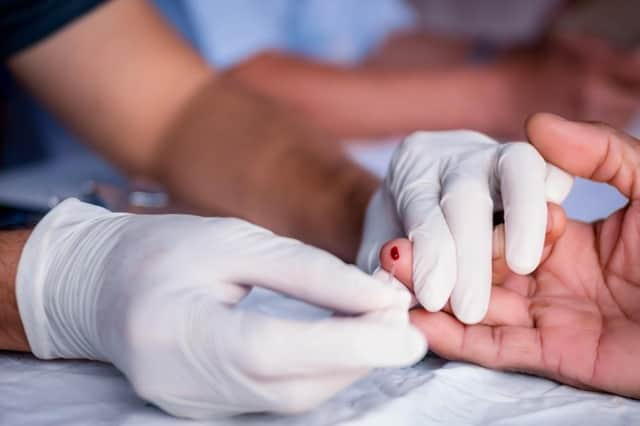What is HIV? Symptoms of the virus, how it differs from AIDS - and where to get a free test


There are around 6,100 people living with HIV in Scotland, and 92% of these people have been diagnosed, according to Health Protection Scotland.
It is easy to get tested for the virus in Scotland, and while there is no cure for HIV, there are now very effective treatments that allow people who test positive to live a near-normal life.
Advertisement
Hide AdAdvertisement
Hide AdHere’s all the HIV symptoms to look out for, and how you can book a test.
What is HIV?
HIV (human immunodeficiency virus) is a virus. Once infected, it can damage your immune cells which means your ability to fight off infection is weakened.
AIDS (acquired immune deficiency syndrome) is the name for the number of infections and illnesses that you can catch if your immune system has been affected by HIV.
With an early diagnosis of the virus and modern treatments, most people who test positive for HIV will not develop any AIDS-related illnesses, and will live a long and healthy life.
HIV can be transmitted from one person to another, and in the UK most cases of the virus are transmitted by having sex with someone who has HIV without using a condom.
Someone with HIV can pass it on, even if they don’t have symptoms. However, HIV treatment significantly reduces the risk of someone transmitting the virus to another person.
What are HIV symptoms?
Symptoms for HIV are similar to flu, and are a sign that your immune system is fighting off the virus.
When infected, most people experience a short illness which can happen two to six weeks after infection. These symptoms can then last for one to two weeks.
Advertisement
Hide AdAdvertisement
Hide AdYou may not experience any other symptoms for several years after the initial illness.
According to the NHS, the most common symptoms are:
Raised temperature (fever)
Sore throat
Body rash
Other symptoms can include:
Tiredness
Joint pain
Muscle pain
Swollen glands
If you have any of these symptoms, you do not necessarily have HIV as they can also be caused by many other common conditions.
After these initial symptoms, the virus continues to be active and causes progressive damage to your immune system, which can take up to 10 years.
Once the immune system becomes more damaged, symptoms can include:
Weight loss
Chronic diarrhoea
Night sweats
Skin problems
Recurrent infections
Serious life-threatening illnesses
How can I get tested for HIV?
The only way to find out for certain if you have the virus is to take a test.
HIV testing is provided to anyone for free through the NHS, with many clinics giving you the result on the same day.
In Scotland, sexual health services can test you for free for HIV, and you can use the Sexual Health Scotland service finder to find your local clinic.
You can also be tested at a GP for free.
There is the option to be tested privately, but you will have to pay for the service.
Advertisement
Hide AdAdvertisement
Hide AdHome tests are also available, and you can order a postal test that you can send away for results or a self-test that shows a rapid result.
Terrence Higgins Trust provide self-test kits for £15, with a limited number available for free.
When should I get tested?
You should seek medical advice straight away if you think you could be infected with HIV, as the earlier the virus is diagnosed the earlier treatment can begin.
Your GP or a sexual health professional can talk to you, without judgement, about taking a test.
They will also discuss whether you should take emergency HIV medicine, post-exposure prophylaxis (PEP), which can prevent infection if taken within 72 hours of being exposed to the virus.